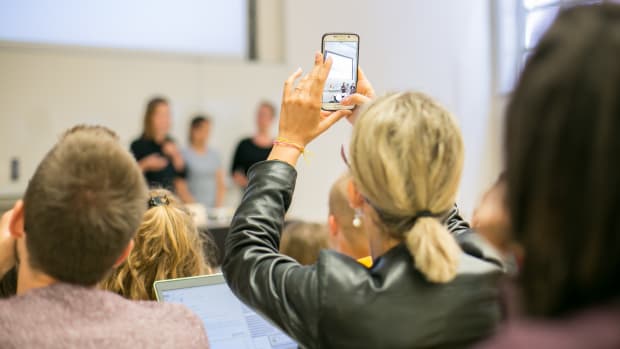
A smartphone ban at university? “Responsibility lies with the student”
A cell phone ban, following the lead of high schools, is also under consideration for mbo. Would something like this work at university? “As long as you don’t disrupt class, use is not a problem and the responsibility lies with the student.”
The MBO Council wants to ban cell phones from the classroom, wrote Trouw earlier this week. Secondary schools have already banned cell phones in class as of this year and primary education will follow next school year.
The Council advocates similar rules for secondary schools. This is because phone use is said to distract too much from primary tasks and have a negative impact on student performance. It also leads to concentration problems and poorer sleep among young people, according to recent research by UvA PhD student Tim Siebers.
Peter Starreveld, program director of the Psychology bachelor’s program, cannot envision a phone ban at the university. “At the Bachelor of Psychology faculty, we don’t have explicit rules for smartphone use, only implicit ones. During lectures, everyone can use a laptop or smartphone to take notes, for example. During study groups, on the other hand, instructors intervene when students use their smartphones when there is no need to do so. This is done in a friendly manner, which works. In addition, students themselves recognize that it is better to pay attention and participate. This policy works fine, so there is no need for a ban as far as we are concerned.
University lecturers Maarten Blom and Jessie Poelsma of Forensic Sciences don’t think a smartphone ban is a good idea either. “I think smartphone use is the responsibility of the student,” said Blom, “They are often already adults, unlike MBO students. We do see that the phone has an effect on students’ ability to concentrate when, for example, reading long texts or answering complex questions. But on the other hand, they frequently use their phones for study-related things such as looking up information quickly or notifying each other of schedule changes or important deadlines. I would find a phone ban in college childish.
Poelsma continues: “Whether the phone is disruptive also very much depends on the type of lecture. Brainstorming sessions or working lectures involving a lot of interaction between students are conducted ideally without phones. With me, then, the maxim is, “As long as you do not disrupt the class, the use is not a problem. The responsibility lies with the student to understand the material discussed. The smartphone also plays an important role in teaching, for example, for quizzes during lectures using apps such as WooClap or Kahoot.”
Students themselves also see little point in banning phones in college. “I think it is our responsibility to pay attention to our phone use. Besides, I only want to use my phone during breaks or activities of study associations at the university,” says Nature & Astronomy student Melvin Room (20). Psychobiology student Sanne Spigt (20) agrees. “At uni, you are old enough to take that responsibility yourself. MBO and HBO students are often taught in a classroom setting and are usually somewhat younger. There I can imagine that they are more easily distracted by their phones and that their performance suffers as a result. However, I don’t think it’s a bad idea if teachers follow a stricter approach during class for unnecessary phone use. Ultimately, it can distract you from your tasks or lectures.”
On top of that, for many students phone use is also inseparable from university life. “For last-minute schedule changes, we rely heavily on the phone. It is also used by professors for course evaluations or quizzes in class,” says sociology student Virgil Mussendijk (25). Math student Louis de Vetter (18) also finds the smartphone indispensable in college. “I use it to pay in the cafeteria and to navigate around campus. However, I do think professors should have the right to ban phones from class. Once I heard a professor say to a fellow student, ‘If you don’t put your phone away, you might as well stay away.’ I agree with that.”
According to associate professor Amber van der Wal, who researches the effects of digital technology and social media on young people and their well-being, it is a misconception to think that students at colleges and universities are immune to the disruptions of smartphones. “The above-mentioned research by doctoral student Siebers shows that the pattern of short-term interactions with social media, in which young people repeatedly switch their attention between smartphone and their environment, is particularly detrimental to their ability to concentrate. Students’ brains are also still developing and may therefore be especially sensitive to such distractions,” van der Wal said.
Van der Wal also thinks that a formal ban on smartphone use could be perceived as particularly invasive. “University students are officially adults and are pursuing their education voluntarily, not because of a compulsory education. So I would advocate an approach that actively includes students in the management of their smartphone use. A code of conduct with clear guidelines for smartphone use within the academic setting would be more effective than a strict ban. Such a code would not only support students in taking responsibility for their learning environment but also train them in self-regulation. This would promote both their personal growth and academic performance.”


